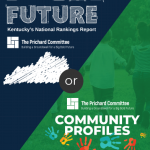
Time for a Jolt to Recharge Education Progress
By Brigitte Blom | December 13, 2022
Like Marty and Doc in the 1985 science-fiction blockbuster “Back to the Future,” we find ourselves returning to the past to ensure the Big Bold Future we know can be ours!
This year brought blow after blow, showing Kentucky losing ground to other states on important indicators of education progress.
While much of this traces to the upheaval of the COVID pandemic, we started seeing signs of decline in 2017. To get Kentucky back on track, we must focus on COVID recovery, but also rethink education to meet the future with greater strength, resilience— and sustainable progress. Consider the following examples of hard-won progress lost:
- 29th in fourth-grade reading — a fall from 22nd in 2019 and a high of 8th in 2015.
- 28th in eighth-grade reading — a drop from 25th in 2019 and a peak at 12th in 2011.
- 34th in fourth-grade math — a fall from 30th in 2019 and 21st in 2015.
- 41st in eighth-grade math — down from 36th in 2019 after reaching 33nd in 2011.
Because COVID had a disproportionate impact on those with fewer resources, Kentucky, a poor state, was likely hit harder than other states. Our losses could have been worse. We should acknowledge the strength in our systems that kept us from outright free fall — and meet our declines in the rankings with resolve to work smarter and harder — together and without division.

By Brigitte Blom
President & CEO
We must also recognize that test scores in reading and mathematics are not all that parents, students, communities, and businesses expect from a world-class public education. The 1990 Kentucky Education Reform Act defined seven capacities required of students (with an eighth added in 2000). These include the durable and transferable skills that will serve students in a changing economy and world. Communication, leadership, critical thinking, and collaboration are among these skills.
While we don’t — and arguably shouldn’t — try to boil these skills down to standardized tests, a diploma should ensure meaningful evidence of skill development. Students should practice and be able to articulate how they developed these competencies. A “meaningful diploma” must assure that Kentucky’s students are prepared to succeed.
Our work, as a citizen-led, nonpartisan and independent organization — is the same as ever: striving to create conditions for success and progress. That means advocating for the policy and investment solutions that strengthen our system, like passage of the 2022 Read to Succeed Act and the General Assembly, so far, meeting our six-year Big Bold Ask investment requests for early childhood, K-12, and postsecondary.
It also means supporting and amplifying local solutions to the needs of students and families — a
Groundswell for community and family engagement. Communities need to be at the table.
Sustainable improvement will not be just the work of our school districts, early childhood providers and postsecondary institutions. It requires all of us to be part of the solution.
While we won’t be traveling back to the future in a DeLorean, we are indeed looking for a lightning bolt to restore our momentum. That jolt can come from Kentuckians uniting around a shared commitment, putting the pedal to the metal, and accepting nothing less than reaching that Big Bold Kentucky Future, together!



